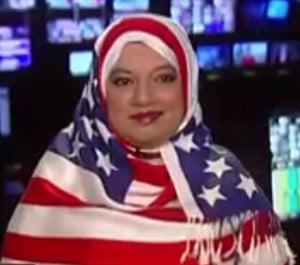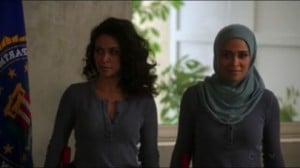The CBC Radio show C’est la vie, an English-language show about “life in French-speaking Canada,” recently interviewed Natasha Ivisic, a woman from the Montreal area who has produced a documentary called Je porte le voile, or “I wear the veil.” The podcast of the show can be found here (look for the November 29, 2009 episode), and this particular episode was described on the show’s website as follows:
Natasha was born and raised a Catholic in Montreal. But when she met her future husband, she converted to Islam. Natasha was proud to wear the veil, and testified wearing it at the Bouchard-Taylor hearings on reasonable accommodation. Now, as her daughter contemplates wearing the veil, Natasha has made a documentary. Hear her story on C’est la vie.
Interviewer Bernard St-Laurent spoke to both Ivisic and to Yanick Létourneau, the co-director of the documentary. St-Laurent introduces Ivisic as someone who wore hijab for thirteen years, and “was proud to wear it.” Ivisic was born in Quebec, to parents from originally from Bosnia and Croatia, and was raised Catholic. She became Muslim in the early 1990s.

As Ivisic explained in the interview, she began wearing hijab around fourteen years ago, after the birth of her second child, a daughter, because she believed that the headscarf was required, and wanted to set a good example for her daughter, with the hope that she would see her daughter happy with it and would choose to wear it herself. She describes the first time wearing it as difficult, but positive, that she was proud to be doing it for God and to display her Muslim faith.
Many years later, Ivisic decided to make her documentary because her daughter was at an age where she was beginning to think about wearing the headscarf. In making the documentary, Ivisic wanted to speak to a variety of Muslim women about why they do – or don’t – wear it. She also wanted to dispel myths about the headscarf and about the women who wear it.
If you’re interested, a trailer for the film is available at this link. The trailer begins with Ivisic’s daughter asking her mother why she wears the veil, and later shows a conversation with two Muslim women, one who wears it and one who doesn’t; the one who wears it argues that it is a clear religious obligation, and that people shouldn’t just pick and choose their religion. Ivisic’s mom is shown, questioning why her daughter should have to stand out and made to appear different. The end of the trailer shows the family at the dinner table, with Ivisic’s husband emphasizing that girls can’t be forced to wear the scarf; Ivisic agrees, but also argues that her daughter will have to make a choice at some point.
Interestingly, the trailer doesn’t really acknowledge a significant result of the documentary process: Ivisic actually ended up removing her headscarf. As she explains in the interview, the film process led her to try to answer some of her own questions, and to explore where she fits within the many experiences and understandings of Islam. She says that she felt that she had come to a point where many of her religious practices were done to please others, and that she lost the reason that she was wearing it in the first place. Her decision to remove the headscarf was articulated as part of a process of starting over, in order to rebuild her relationship with God. The interview included an audio clip taken from the film of Isivic’s conversation with her daughter after telling her that she was removing her scarf; her daughter was clearly surprised by her decision, and expressed worry about not having a role model for her own if or when she decides to wear it. Ivisic explains that she and her daughter now have an even closer relationship than before, and that her daughter, now age fourteen, is still taking her time to decide on whether she will wear hijab or not.
I haven’t seen the documentary itself (although I’m going to try to get a copy so that I can review it too), but I thought this was a pretty good interview. I appreciated that it was a very honest discussion, and not some kind of attention-grabbing testimonial about having escaped the tyranny of the veil; in fact, Ivisic expresses hope that people won’t see the movie’s conclusion as a sign of “oh, she’s free now,” and that instead she is happy to see that many people have reacted to the film with “a positive view of Islam.”

She also leaves the possibility open that she may wear hijab again, stating that, after having taken off the veil:
There is a sense of freedom, a sense that this time I’m not trying to impress others, but I’m trying to more live Islam from the inside, and slowly, hopefully show it from the outside. I’m not saying no to the veil – you never know what’s going to happen. And I think that’s what I learned, that you can question, you can change your mind, you can search, you can find ways, and then decide, well, okay, I’ll try the other way, and still be Muslim… I’m still questioning, and my journey’s not finished, so I think that’s what the message is. Your journey’s never finished.
Regardless of how we feel about her specific decisions, I think that image of being Muslim as a journey is a really important point. It’s easy for “Muslim woman” or “hijab-wearing woman” to come across as static identities, as if once you’ve manifested those identities in a particular way, there’s no changing it. That may be the ideal, for some people, but for many, it is not the reality. And, even for those who do decide to wear hijab and don’t take it off, I think Ivisic’s comments reflect the the ongoing need to be in touch with one’s intentions, since any religious act can lose meaning and become habit if we let it; it’s not like the journey ends once we decide to dress (or otherwise practise Islam) in certain ways. The discussion in the interview was honest and thought-provoking, and I’d be interested in seeing how these topics were taken up in the film itself.











